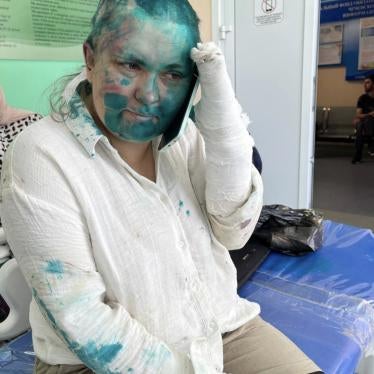When he was here last week, Prime Minister Jose Socrates told Russia’s President Vladimir Putin that there would be no more European Union moralizing about Russia’s human rights record, saying that “no one should claim to lecture anyone else" [“ninguém pretenda dar lições a ninguém"]. This was a victory for Putin’s increasingly authoritarian policies, a terrible blow to Russia’s besieged civil society, and a bad omen for Portugal’s upcoming presidency of the European Union.
As Russia has become more assertive in international affairs, thanks in large measure to its lock on gas exports to the European Union, it has become increasingly petulant in response to the rare foreign expressions of concern about its worsening human rights situation. At the same time, the Kremlin has adopted more repressive measures at home to silence criticism.
Socrates rightly said that “as democracias são sempre obras inacabadas” [“democracies are always unfinished affairs”] eerily, though perhaps unwittingly, mimicking Putin’s recent statement that “no democracy is perfect.” Few of Europe’s neighbors, though, have so rapidly unraveled historic achievements in human rights. The Kremlin has rolled back the key gains of the glasnost era by silencing nearly all broadcast media and, increasingly, the print media. It has sidelined liberal opposition parties and increasingly interfered with the judiciary. A new law on NGOs allows for unprecedented government interference, and the government has used lawsuits and administrative measures to harass and intimidate NGOs that work on such sensitive issues as Chechnya.
The atmosphere has worsened in the lead-up to the 2008 presidential elections, with excessive police violence used to break up rallies and greater restrictions on assembly, as the EU officials saw first hand when authorities harassed and detained activists planning protests at last month’s EU-Russia summit in Samara. (My deputy was detained and prevented from boarding the plane to Samara, where he was to monitor a planned demonstration.)
Meanwhile, in Chechnya -- the conflict Europe has tried to forget -- torture, secret detention, and “disappearances” are routine, but the Kremlin denies they are a problem and does nothing hold perpetrators accountable.
In recent years, EU expressions of concern have been muted by Russian bulling and a desire for Russian energy. Under German Chancellor Angela Merkel’s leadership, the EU finally did speak up in the face of the harassment at last month’s summit, only to have that signal undermined less than a fortnight later by Socrates’ embarrassing pandering.
Speaking honestly and directly about repression and abuses is not the same as “lecturing” [“dar lições”]. It is about treating Russia like a fully fledged partner that is capable of hearing and addressing criticism.
The EU is the world’s leading collection of democracies, founded on a commitment to liberty and the rule of law. As Portugal inherits the leadership mantle, it must use it to engage a robust dialogue between the EU and Russia about human rights concerns, urging the Kremlin to restore freedom of expression, stop harassing NGOs, and start a meaningful accountability process for atrocities in Chechnya.







